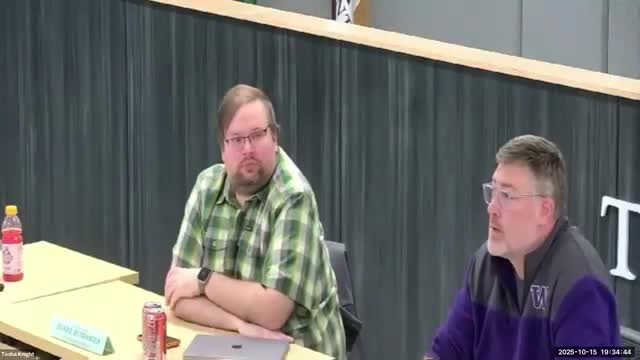Staff outlines Title 20 modernization to reorganize Thurston County rural zoning code; effort described as structural, not substantive
Get AI-powered insights, summaries, and transcripts
Subscribe
Summary
Senior planner Maya Tippel presented a proposed reorganization of Title 20 (the county’s rural zoning code) intended to reduce duplication and make the code easier to use; commissioners asked for clearer decision trees, discussed scope and potential docket items, and proposed adding a review of the county 'right‑to‑farm' language.
At its Oct. 15 meeting the Thurston County Planning Commission received an overview of a proposed Title 20 Modernization project intended to reorganize — not substantially change — the county’s rural zoning code.
Maya Tippel, senior planner, described Title 20 as “fragmented” after decades of piecemeal updates and said the proposed project would consolidate repeated standards, provide clearer tables of uses and standards, and make the code easier for both staff and the public to navigate. Tippel said the work is primarily structural and that substantive amendments would be called out separately; the effort would begin in earnest after the county completes its comprehensive plan work and staff would pursue stakeholder outreach and internal code review in early 2026.
Why it matters: Title 20 governs land uses, lot standards, setbacks and permit procedures in Thurston County’s unincorporated rural areas and several southern urban growth areas. Reorganizing Title 20 could reduce internal inconsistencies and shorten permit review time for applicants.
What staff proposed: Tippel presented a model used elsewhere — a unified development code format with centralized chapters for uses, standards, administration and procedures instead of identical language repeated across each zoning district. The proposed approach would retain existing uses and standards but compile them in consolidated tables and chapters so users would consult fewer sections to apply rules.
Commission questions and public discussion focused on implementation and priorities. Commissioners asked for user‑facing decision matrices that would allow applicants to understand in advance what reports and steps are required. Commissioner Scott Nelson described an example in another county where applicants receive a detailed checklist of required reports and steps within 72 hours, saying that predictability is valuable for economic development. Tippel said staff aims to produce clearer procedural documents and permit checklists as part of the implementation work.
Commissioners also discussed the potential cost and staffing intensity of a full, consultant‑led code rewrite; Tippel estimated that a comprehensive code rewrite integrating multiple titles would require substantially more resources and may be comparable in effort to the county’s last periodic comprehensive update, while a Title 20‑only reorganization would be more manageable.
Docketed items and possible additions: Tippel said a separate docketed code amendment addressing cannabis regulations intersects with Title 20 and could be processed concurrently but would require stakeholder outreach. Several commissioners proposed adding or prioritizing a review of the county’s “right‑to‑farm” language (a code chapter in Title 20). Commissioners discussed whether adding statutory language to clarify protections and cost recovery for landowners facing nuisance complaints would be an appropriate docket item; staff said the right‑to‑farm provision is in Title 20 and could be scoped as a substantive amendment.
Technology and plain‑language concerns: Commissioners debated whether artificial‑intelligence tools could assist the reorganization. Tippel and staff cautioned that current generative AI tools can be “confidently wrong” and that human review is required; they said staff could explore AI assistance for drafting summaries but would not rely on AI for final legal code text.
Next steps: Staff plans stakeholder outreach in early 2026 and to bring a draft structure and code changes to the planning commission later in 2026. Tippel said the project’s goal is to reduce redundancies, improve clarity and set the code up for future integration with other titles if the county decides to pursue a unified development code later.
Ending: Commissioners generally supported the reorganization approach while identifying priorities for staff — decision matrices, stakeholder outreach on cannabis and a proposed review of right‑to‑farm protections — to consider as the scoping advances.
